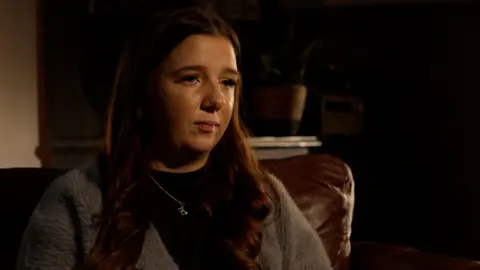Woman, 31, made a will fearing husband would kill her

 BBC
BBC
Warning: This article contains details of abuse some may find distressing
Making a will and taking out life insurance at 31 seemed like necessary steps for a woman who thought she would die at the hands of her abusive husband.
Describing how he would pull out her hair, stamp on her head, stop her sleeping and washing, Ceri Owen said she was reduced to “a shell of a person”.
She went from an outgoing, confident person during their five year relationship to one who felt worthless, and urged women in similar situations to seek help.
The UK government has pledged to clamp down hard on perpetrators of domestic violence, with the minister for victims likening them to “terrorists”.
“It became a lot of more aggressive and frequent,” Ceri, now 33, told the BBC Wales Live programme.
“Pinning me down, punching me, pushing me over and digging his nails into me.”
Over the five years, things had changed slowly, from name calling, to controlling her behaviour.
Her partner would try and control when she was allowed to sleep or bath.
Trying to rationalise it now, Ceri, from north Wales, said: “I found it became my normal, I’d think I was crazy and that it was all my fault.
“I’d gone from a confident outgoing person, to a point where I was silenced and wouldn’t argue back.
“Mentally I thought I was worthless.”
Ceri feared she would die – either at the hands of her partner, or through not being able to cope.
A “lightbulb moment” came when her boss noticed a change in her behaviour, as she added: “I think someone else recognising it outside of friends and family, made it seem more real for me.
“He was helpful and supportive.”
Ceri knew she had to leave as she wanted to end her own life, saying: “I could not survive being there any longer.”
Despite ending the relationship, her ordeal was not over.

 Ceri Owen
Ceri Owen
In May 2022, her ex-husband broke into her house at night and attacked her, along with new partner.
It followed an escalation in his behaviour in the days leading up to this, as she added: “I think I’d had about 500 calls in the three days before.
“He came to the house quite a few times but I had managed to get him to go away.”
North Wales Police investigated, and Ceri’s ex-husband was charged with assault, controlling and coercive behaviour and stalking involving serious alarm.
He admitted the offences and was jailed for three years and two months in February 2023, as well as being banned from contacting Ceri or her new partner for a decade.
Ceri decided to speak out to raise awareness of dangerous signs in a relationship.
“No form of abuse is acceptable, no-one does anything to deserve being abused and there are people and services that can help you,” she said.

 Ceri Owen
Ceri Owen
Ceri was described as “courageous” by North Wales Police Chief Constable Amanda Blakeman.
She is the Wales lead for violence against women and girls, and added: “I would hope that Ceri’s story would help give people confidence that if they ring us, we will listen and we will look at action.”
In July, the National Police Chiefs’ Council declared violence against women and girls a “national emergency”.
This was after it was revealed that more than one million related crimes were recorded in Wales and England in 2022-23, making up 20% of all crimes documented by the police.

 Ceri Owen
Ceri Owen
Minister for victims, Pontypridd MP Alex Davies-Jones, said the issue is as serious as terrorism.
She added: “It is, and it has been for a very long time.
“If this was terrorism, it would be front page news, every single day.”
She believes Ceri would have helped countless women by speaking out, but said: “Sadly her story is not unique.”
The UK government has pledged to halve violence against women and girls in a decade.
Plans including domestic abuse specialists in 999 control rooms in Wales and England have already been announced.
“On average, three women a week are killed at the hands of men because of domestic abuse and violence in this country,” Ms Davies-Jones added.
“That is totally unacceptable and it has to change.”
She said the scale of the issue is “horrific” and reported statistics are the “tip of the iceberg”.








